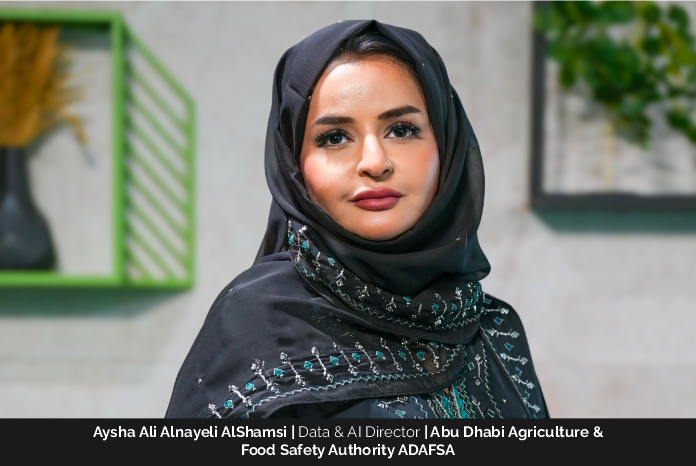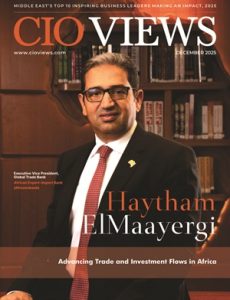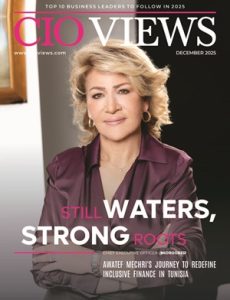The urgent global need for food security and environmental sustainability is transforming how nations think about their future. In this space where science and technology converge, Aisha A. Alshamsi, Director of Data and AI at the Abu Dhabi Agriculture and Food Safety Authority (ADAFSA), is leading a movement that blends innovation with responsibility. Through her pioneering work in artificial intelligence and sustainable agriculture, she is creating solutions that serve both present and future generations, ensuring that the UAE not only adapts to challenges but sets new standards for others to follow.
A Knowledge-Driven Journey with National Vision
From her earliest days, Aisha drew inspiration from the UAE’s leaders, who consistently promoted knowledge as the foundation for progress. “The path of knowledge is the path of service to the nation,” she reflects. Her professional journey began in chemistry and research, where she quickly recognized the potential of data to drive public health, policy, and development. Over time, she transitioned from laboratory analysis to data leadership, recognizing that data is more than a technical detail. “It is a compass for development and informed decision-making,” she explains.
Working in government laboratories in Abu Dhabi gave Aisha a deep understanding of how rigorous scientific analysis safeguards food quality and safety. These experiences shaped her conviction that technology must solve real problems, from increasing crop yields to making food inspections more efficient. “Real innovation is not about technology for the sake of technology,” she says. “It is about addressing real-world problems in a sustainable and impactful way.”
Defining Government Excellence and Digital Transformation
For Aisha, government excellence is not about scale but about focus, accountability, and results. “Excellence is, at its core, people-focused,” she explains, stressing that technological transformation must improve daily life and strengthen public confidence. She views digital transformation not as a side project but as a mission that builds trust between governments and societies through transparency and measurable outcomes.
Her philosophy is simple yet profound: success must be evident in outcomes such as safer food, stronger agriculture, and public services that exceed expectations. By grounding technology in ethics and governance, she ensures that every project at ADAFSA serves the long-term public good. “We embrace data analytics and AI, but we anchor them in responsibility, so innovation becomes a tool for public benefit,” she says.
“Data is the new soil of agriculture—and with the right algorithms and ethical practices, it can help us cultivate a sustainable future.”
Building a National Shield with Data
Among her proudest achievements is the Abu Dhabi Food and Agriculture Data Platform. “Food security cannot be guaranteed without precision, without facts, without data,” Aisha emphasizes. Developed over years of preparation and accelerated by the global pandemic, the platform now serves as the proactive analytical brain of Abu Dhabi’s food and agriculture sector.
With more than 350 key indicators and 200 interactive dashboards updated in real time, the platform predicts and mitigates risks before they can disrupt supply chains. Algorithms designed under her leadership have identified alternative import sources, improved the UAE’s Global Food Security Index ranking, and forecasted animal diseases with striking accuracy. “These algorithms were not born by chance,” she explains. “They are the result of years of data collection, analysis, and strong scientific partnerships.”
The measurable impact has been transformative. The system has reduced dependency on single-point-of-failure suppliers for essential commodities by 30 percent, enhanced farmer productivity by 25 percent, and cut disease outbreak hotspots by 40 percent. For Aisha, these figures are not just statistics but evidence of a lasting legacy that strengthens the UAE’s food future.
Ethics at the Core of AI
As she drives the adoption of AI in agriculture and food safety, Aisha insists that innovation must rest on ethical foundations. She personally spearheaded ADAFSA’s AI Ethics Charter, the first of its kind in Abu Dhabi. “Success is not just about developing algorithms but ensuring these solutions are underpinned by ethical and transparent principles,” she explains.
Her dedication has earned ADAFSA international recognition, including ISO/IEC 42001:2023 certification for AI management systems and the Artificial Intelligence Enabled Solution Award from ICMG Global. Under her leadership, ADAFSA became the first entity worldwide in the field of agriculture and food security to achieve the ISO/IEC 42001 certification. By ensuring human expertise remains central and promoting transparency, Aisha has established a framework for AI that has become an international benchmark of integrity.
Expanding Horizons Through International Collaboration
Aisha believes that global challenges require joint solutions, and she has established collaborations with leading research institutions, universities, and international innovation centers. Under her leadership, ADAFSA works with the Food and Agriculture Organization of the United Nations (FAO), as well as prestigious universities and global research centers such as Mohamed bin Zayed University of Artificial Intelligence (MBZUAI) and Khalifa University, in addition to specialized startups in artificial intelligence and agri-tech. These partnerships aim to exchange knowledge, strengthen scientific research, and develop advanced predictive models that support food security.
Such initiatives demonstrate that her work is not confined to national borders. They highlight how Abu Dhabi, under her leadership, is contributing to a worldwide dialogue on resilience, sustainability, and innovation in agriculture.
Leadership Rooted in Resilience and Empathy
Aisha’s path was not without challenges. Early in her career, she often found herself one of the few women in technology meetings, where earning recognition demanded greater effort. “Those experiences taught me the true meaning of confidence and resilience,” she recalls. Today, she leads with empathy, encouraging inclusivity and empowering young professionals to embrace responsibility.
Her leadership style promotes environments where ideas thrive and collaboration flourishes. Internal hackathons, cross-disciplinary projects, and national programs such as the Sheikh Mansour bin Zayed Agricultural Excellence Award have transformed her teams into engines of innovation. “Innovation has become a core pillar from what once was a peripheral pursuit,” she explains, underscoring the collective effort behind national progress.
“For artificial intelligence to truly serve the public good, it must be as ethical as it is intelligent. We insist on transparency, fairness, and accountability in every solution we deploy.”
Linking Vision to National Strategies
Aisha’s work is deeply aligned with the UAE’s long-term vision. She connects her projects to both the National Food Security Strategy 2051 and the UAE Centennial 2071 agenda, ensuring that her initiatives serve the broader goals of sustainability, resilience, and prosperity. Whether through predictive water-use models or epidemic early-warning systems, she ensures that every step taken today contributes to a secure tomorrow.
“Your work can turn into safer food or more effective services,” she says. “When things get tough, keep in mind that your purpose is public well-being.” By aligning with the nation’s priorities, she reinforces the message that data and AI are strategic tools for building resilience at both national and global levels.
The Next Frontier of Agricultural Technology
Looking to the future, Aisha sees agriculture moving toward smart, connected ecosystems driven by emerging technologies. She identifies AI, machine learning, IoT sensors, robotics, blockchain, and advanced biotechnologies as forces that will reshape farming. “The ultimate outcome will not just be increased productivity,” she notes. “It will be a more resilient, secure, and sustainable world.”
Pilot projects led by her team are already testing these innovations on local farms, from predictive irrigation systems to blockchain-based supply chain tracking. These initiatives demonstrate how the UAE is positioning itself as a global leader in applying advanced technologies to agriculture and food security.
Inspiring the Next Generation
For young women aspiring to careers in AI and data, Aisha offers guidance that is both practical and empowering. ““No matter how unique your presence may seem in any room, remember that your vision and knowledge are your true passport and source of strength — your place is defined by your contribution, not by the numbers around you.” she says. She encourages aspiring leaders to trust their vision, invest in education, and commit to lifelong learning. She also stresses the importance of mentorship and clear communication, reminding them that their voices can shape the future.
Her message is simple yet powerful: remain mission-focused and remember that knowledge is both a personal asset and a national duty.
Shaping a Sustainable Future
Aisha’s ultimate vision is to create smart, resilient food systems that future generations can depend on. “All we do today in data and AI is connected to a long-term vision of sustainability,” she explains. From predictive models that optimize water use to early-warning systems that prevent epidemics, her initiatives pave the way for a safer and more sustainable world.
She envisions farming as a high-tech industry that offers opportunities to young minds while preserving ecosystems. “Through the power of innovation for good, we are sowing the seeds of a resilient, food-secure future that our grandchildren and great-grandchildren will harvest with confidence,” she says.
Conclusion
Aisha A. Alshamsi’s story is one of dedication, innovation, and national service. Through her leadership at ADAFSA, she has transformed data into a strategic shield that strengthens food systems and advances sustainability. Her career demonstrates that when innovation is grounded in ethics, aligned with national vision, and connected to global collaboration, it has the power to change lives.
“The greatest contribution to the nation by science and knowledge is the maximum sense of belonging,” she asserts. In her work, data and AI are more than tools. They are the foundations of a future where food security, sustainability, and national development flourish side by side.





